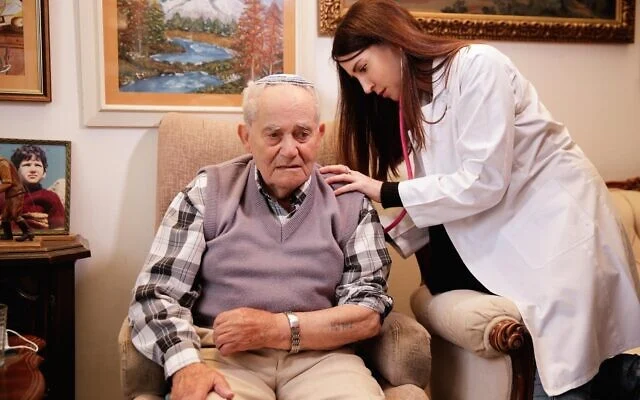The unique organization where Arab doctors bring healing to Holocaust survivors
In a country shaped by history and conflict, unexpected connections are forming through acts of compassion and care. A group of doctors is bringing humanity into focus as they care for some of Israel’s oldest citizens in their most vulnerable moments.

In the quiet city of Kiryat Bialik, just before Holocaust Remembrance Day, two Arab doctors; one Christian and one Muslim, stepped into the homes of Holocaust survivors not just as physicians, but as listeners, learners, and unlikely sources of comfort. Dr. Yosif Boulos and Dr. Fadi Badarna, colleagues at Carmel Hospital in Haifa, volunteer with LeMa’anam, a nonprofit that offers free home visits to elderly Holocaust survivors across Israel. As they examine their patients, they also bear witness to history written in numbers tattooed on forearms and memories carried in silence for decades.
The visit to 98 year old Auschwitz survivor Chana Sandouvsky offered more than a routine eye exam. The doctors paused to acknowledge the faded number A14147 inked into her arm, a visible scar from the Holocaust that speaks volumes. Sandouvsky, wrapped in both age and the weight of memory, shared a glimpse of her story: daily treks through snow in mismatched shoes, endless hours cutting wood, the haunting absence of family. Dr. Badarna, witnessing this for the first time, was visibly moved. “It’s shocking,” he said quietly after the visit. “At least we did her some good.”
The work of LeMa’anam began during the COVID 19 pandemic, when Dr. Tamara Kolitz recognized that many Holocaust survivors were isolated and in need of care. Since its founding in 2020, the organization has grown to include more than 1500 volunteers, providing over 12000 medical visits. In the shadow of recent war and ongoing trauma, these encounters between Arab doctors and elderly Jewish survivors hold extraordinary meaning.
For Badarna, whose mother also volunteers with the elderly in Sakhnin, these visits are deeply personal. “This isn’t about politics or religion. It’s about seeing people as people,” he said. For Boulos, the mission is simple: “They just need someone to care.”
Another stop brought the doctors to Nissim Daito, 90, a Tunisian born survivor who now mourns both his wife and his grandson, an IDF soldier killed by Hamas in the October 7 attacks. “My father says he shouldn’t be alive, his grandson should,” said his daughter. In these moments, medical visits become something more: a lifeline between past and present, tragedy and compassion.
When the doctors visited Henia Hirsh, a Romanian survivor from Sighet, she recalled being told to pack for three days. Those days turned into years in camps and exile. The conversation drifted across languages, Romanian, Hebrew, Arabic, even Yiddish, but its core was universal: resilience, loss, and the will to endure.
In a country shaped by war and conflict, these quiet, human exchanges between Arabs and Jews offer something rare: a shared space of empathy and healing. “Simple human encounters,” said Badarna, “can remind us of everything we still have in common.”